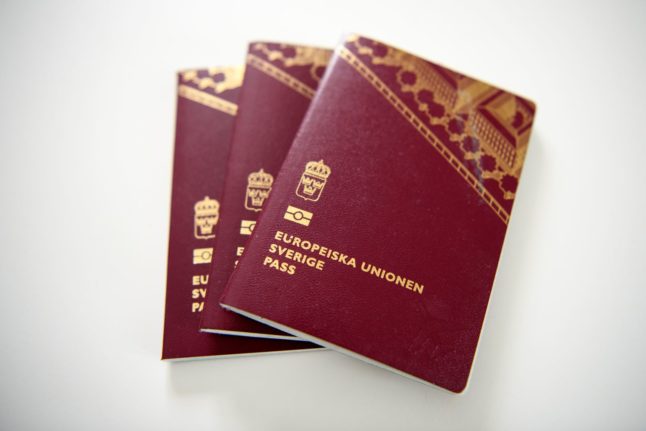Essentially, there are three different routes for getting Swedish citizenship. The first happens automatically by birth or adoption, for children who have at least one Swedish parent at the time of their birth or adoption.
For immigrants, there are two routes.
Citizenship via application
The first option is medborgarskap genom ansökan (citizenship via application) which is by far the most common option for immigrants applying for citizenship in Sweden.
This is the most restrictive route for applying for citizenship, with rules requiring you to have lived in Sweden for at least five years, as a general rule (three years for partners or spouses of Swedish citizens and two years for Nordic citizens).
You also have to have “lived an orderly life in Sweden”, by, for example, not having a history of debts with the Swedish Enforcement Authority, as well as an extra qualifying period if you’ve committed a crime. You’ll also need a permanent residence permit or right of residence under EU rules.
It also comes with a hefty fee of 1,500 kronor.
See here for more information on the rules for applying for this kind of citizenship.
Citizenship via notification
The less well-known option is medborgarskap genom anmälan (citizenship through notification). This is available to children who have lived in Sweden for at least three years (two if stateless), young adults between 18 and 21 who have lived in Sweden since they turned 13 (15 if stateless) and Nordic citizens – meaning citizens of Denmark, Norway, Iceland or Finland – who have lived in Sweden for five years or more.
The requirements for citizenship through notification are not as restrictive as citizenship through application. There is, for example, no requirement to have “lived an orderly life”, although those who have been sentenced to prison or other incarceration within the last five years do not qualify.
Be aware, though, that this could change in the future. Under proposed new rules, people suspected or convicted of committing certain crimes, deemed a threat to Swedish security or connected to “certain groups and organisations” would be barred from citizenship via notification.
The fee is also lower (475 kronor for adults) and, for adult Nordic citizens at least, you apply to your local Länsstyrelse or County Administrative Board rather than to the Migration Agency. Children and young adults applying by themselves pay just 175 kronor and apply to the Migration Agency.
Waiting times for citizenship via notification are shorter, too – 75 percent of applicants going via the Migration Agency received a response within 11 months, according to agency figures, compared with a wait of 32 months for citizenship via application. For those who can apply via the County Administrative Board, the wait can be as short as 4-6 weeks.
I think I qualify for citizenship via notification. How do I apply?
First, double check that you definitely qualify – you can do this on the Migration Agency’s website (in Swedish) here.
For Nordic citizens, you’ll need to apply directly to your local County Administrative Board, which you can do via filling in this form (Anmälan om svenskt medborgarskap för medborgare i Danmark, Finland, Island eller Norge), and sending in your application to the relevant administrative board, which is determined by the county or län you live in.
Make sure you pay the fee to the relevant board, including your name and Swedish personal number, as they won’t be able to process your application until this is received. Payment details are available on each board’s website.
If your application is successful, you’ll be sent a citizenship document, with another one sent to the Tax Agency. If your application is denied, you’ll be sent a decision document detailing this. You’ll have three weeks to appeal, with information on how to do so provided in the decision document.
In terms of citizenship via notification for children who have lived in Sweden for at least three years, their legal guardian (vårdnadshavare) will need to apply to the Migration Agency. This can be done digitally via the agency’s website or by filling out this form (anmälan om svenskt medborgarskap för barn som bor i Sverige), paying a 175 kronor fee and sending it to the Migration Agency – the address is on the form.
The process (and the fee) is essentially the same for young adults aged between 18 and 21, although you apply by yourself. Again, you can apply online or by filling out a form – in this case the catchily-named anmälan om svenskt medborgarskap för dig som har haft hemvist i Sverige sedan den dagen du fyllde 13 år eller 15 år om statslös och som har fyllt 18 men inte 21 år, paying a 175 kronor fee and sending it to the Migration Agency address on the form.



 Please whitelist us to continue reading.
Please whitelist us to continue reading.
Member comments